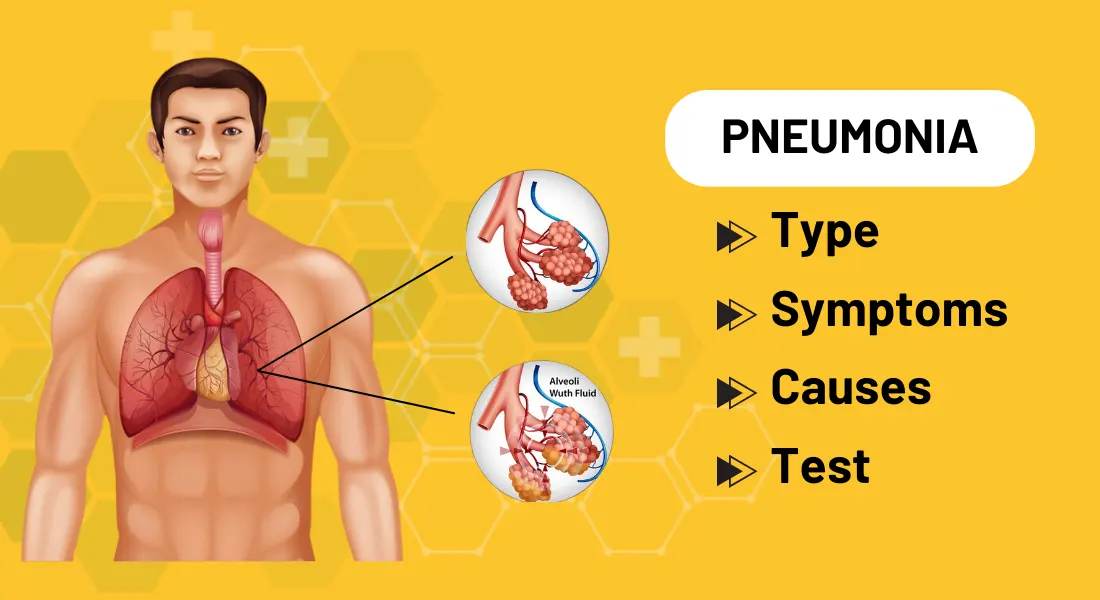Asthma: What Is It? Types, Causes, Symptoms, Test

Asthma is a chronic respiratory illness characterised by narrowing and inflammation of the airways. With a test for asthma, you can undergo the proper treatment. Asthma also causes recurring episodes of coughing, wheezing, shortness of breath, etc.
Person showing symptoms of asthma comes in contact with triggers like allergens, their airways become more sensitive. It leads to the tightening of muscles around the airways. Moreover, the airways produce excess mucous. As a result, the airways constrict, which makes it difficult for air to flow in and out of the lungs.
Asthma is a long-term lung disease. Severe asthma can cause trouble even in daily routine. In other words, it severely affects your everyday routine. Without proper treatment, you might have to stay at the hospital often. Therefore, knowing about test for asthma can help you lead a healthy life.
What Is Asthma?
Asthma is a chronic respiratory disease that affects millions of people across the globe. It is a condition that involves the narrowing and inflammation of the airways. During asthma, you may experience recurrent episodes of coughing, wheezing, shortness of breath, etc.
However, with proper treatment and management, individuals can lead a healthy life. Furthermore, the symptoms of asthma often change over time. So, it is crucial that you collaborate with your doctor to track the signs. A test for asthma can be beneficial to manage the symptoms and severity of asthma.
The Common Types Of Asthma
To effectively manage chronic asthma, you must know the types of asthma.
Types of asthma are:-
- Allergic Asthma
Triggered by allergens, this type of asthma is pretty common among post people. Common allergens like dust mites, pollens, pet dander, etc., can trigger asthma-like symptoms. Allergic asthma is often hereditary. It may also be associated with other allergic conditions like eczema.
- Non-Allergic Asthma
Customary to its name, non-allergic asthma is not triggered by allergens. It is usually caused by factors like cold air, respiratory infections, irritants, etc. Proper diagnostic tests at the right time can help a patient manage their symptoms.
- Exercise-Induced Asthma
This type of asthma is triggered by physical activities or strenuous exercises. The symptoms typically occur doing or after the workout. It may also include wheezing, coughing and tightness of the chest.
- Intermittent Asthma
Intermittent asthma is a classification of the severity of asthma based on the intensity of the symptoms. The severe asthma symptoms occur less than twice a week on average. The common symptoms of this asthma type are coughing, shortness of breath, etc. During intermittent asthma, your lung function may also decrease.
- Persistent Asthma
The symptoms of this asthma may range from mild to severe. In persistent asthma, the symptoms and lung function may vary over time. The main goal of treatment for persistent asthma is to improve the functioning of the lungs and minimise the symptoms.
- Cough-Variant Asthma
Instead of the typical wheezing and shortness of breath, cough-variant asthma is characterised by a dry and persistent cough. In this type of asthma, coughing may become worse during the night. It falls under the umbrella of asthma because the coughing is caused by airway inflammation.
The cough in this type of asthma is caused by increased sensitivity and inflammation of the airways. The airway muscles typically constrict, which leads to coughing. You must know about the proper treatment of asthma to eliminate complications.
- Occupational Asthma
As the name suggests, exposure to certain irritants in the workplace cause this form of asthma. For instance, if your workplace has a higher concentration of dust and chemicals, you can develop occupational asthma.
The symptoms of this asthma may occur during work hours and improve when you’re away from your workplace. The treatment of asthma often involves your healthcare practitioner evaluating your work history.
Symptoms Of Asthma- Essential Aspects To Know
By knowing about the symptoms, you will be better equipped to deal with this chronic respiratory illness. Here are some of the common symptoms of asthma you must know.
- Wheezing
It is a characteristic whistling or high-pitched sound that occurs when you breathe. The main reason behind wheezing is narrowed and inflamed airways.
- Coughing
Another hallmark symptom of asthma is persistent coughing. The cough may be dry or can produce mucous. Moreover, coughing is often worse at night compared to morning.
- Tightness in the Chest
Many patients with asthma describe a sensation of pressure or constriction in their chests. The overall condition can be comfortable and contribute to breathlessness.
- Shortness of Breath
Usually, shortness of breath is one of the common symptoms of asthma. Learning about the causes of asthma may help patients manage their condition.
What Are The Tests For Asthma?
To ascertain the causes of asthma and diagnose it effectively, doctors may recommend various types of tests. The primary role of these tests is to confirm the presence of asthma. By undergoing one of these tests, doctors can determine the best treatment plan.
- Spirometry
It is an important diagnostic test for asthma that monitors your current symptoms. It measures the amount of air you inhale and exhale and how quickly you can do it. During the test, you will be asked to take a quick breath and exhale into a device named a spirometer. It helps to identify the presence of airway obstruction.
- Peak Expiratory Flow Measurement
It is a type of test that analyses the maximum speed at which you can exhale air. The test involves the usage of a peak flow meter. It is a handheld device that measures the airflow when you exhale into it. With regular measurement of the peak expiratory flow, doctors can monitor the changes in your lung function. This test also helps with the identification of asthma triggers.
To manage asthma, patients must be aware of the asthma attack symptoms. Thanks to the evolution of diagnostic tests, you can now manage your asthma-related symptoms properly.
Author’s Bio
Through this blog, the author has tried to bridge the gap between medical expertise and the challenges faced by asthma patients. The blog also underlines the importance of asthma tests in the management of the disease.
DISCLAIMER: THIS WEBSITE DOES NOT PROVIDE MEDICAL ADVICE. The information including text, graphics, images, and other material contained on this website is for informational purposes only. No material on this site is intended to be a substitute for professional medical advice, diagnosis, or treatment. Contact a health expert if you have questions about your health.















Comments List